

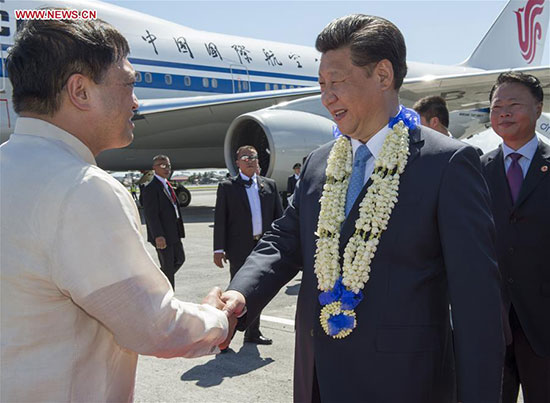 |
| Chinese President Xi Jinping (R Front) arrives in Manila, Philippines, Nov. 17, 2015 for the 23rd APEC economic leaders' meeting. (Xinhua/Li Xueren) |
US President Barack Obama's visit to a Philippine naval frigate on Tuesday is a provocative gesture to hype the South China Sea issue ahead of a major meeting of Asia-Pacific leaders in Manila, Chinese observers said Tuesday.
Obama arrived in the Philippines on Tuesday, where he will participate in the Asia-Pacific Economic Cooperation (APEC) meeting in Manila, scheduled on Wednesday and Thursday.
Shortly after Air Force One touched down in Manila, Obama boarded the Gregorio del Pilar, a Philippines navy frigate that was a US Coast Guard cutter until 2011, but on Tuesday flew the flags of the two allies, AFP reported.
The vessel is now a mainstay of the Philippine Navy, operating around the Nansha Islands in the South China Sea that are claimed by both Manila and Beijing.
Obama also announced two more US ships would be transferred to the Philippines as part of a two-year $250 million package to enhance regional maritime security, one a research vessel o help navigate territorial waters and a coast guard cutter for "long endurance patrols."
"The US has been committed to the security of this region for more than 70 years, we have a treaty obligation, an ironclad commitment, to the defense of our alley the Philippines, who can count on the US," Obama said.
Provocative action
"Obama's visit to the Philippine navy flagship is definitely a political gesture and a provocation to China," Liu Feng, a Hainan-based expert on the South China Sea, told the Global Times.
Liu said he believes the ship visit is in preparation for hyping up South China Sea disputes at the APEC meeting.
Philippine President Benigno Aquino III said earlier that the APEC meet would focus on economic cooperation and would not touch on the South China Sea issue.
But Mark Toner, US State Department spokesperson, said on November 10 that the South China Sea issue would likely come up on the sidelines of the meeting if it is not on the main agenda, Reuters reported.
"The US wants to seize the chance to discuss the South China Sea at the meeting and does not want the topic to fade away. Obama's visit to the navy vessel is meant to draw public attention while many other APEC members showed little intention of raising the issue at the meeting," Liu added.
Gu Xiaosong, an expert on Southeast Asian studies at the Guangxi Academy of Social Sciences, told the Global Times that the US is taking this opportunity to encourage its allies to stand against China on the South China Sea.
"The US is not satisfied with its allies' effort in counterbalancing China's influence. By sending the president onboard a Philippine navy vessel, the US wants to reiterate its stance on the South China Sea issue and call on its allies to stand against China," Gu said.
The US has had a tiger by the tail ever since it proposed raising the South China Sea issue at the meeting. The US does not want its allies to doubt its influence in the South China Sea, so it has to prevail over all dissenting views from relevant countries to insist on provoking China, Liu said.
Real victim
Chinese Vice Foreign Minister Liu Zhenmin said Tuesday that China was the real victim in the South China Sea dispute as "dozens" of its islands and reefs have been illegally occupied by three of the claimants in the dispute. He did not name any countries.
"The Chinese government has the right and the ability to recover the islands and reefs illegally occupied," Liu told reporters in Beijing. "But we haven't done this. We have maintained great restraint with the aim to preserve peace and stability."
Liu said China should deal with issues in the South China Sea at its own pace.
"China doesn't have to pay much attention to the US provocations. All we should to do is to follow our own agenda and improve our relations with Southeast Asian nations," Gu noted.
Agencies contributed to this story
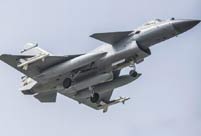 J-10B fighters with homegrown engine in test fligh
J-10B fighters with homegrown engine in test fligh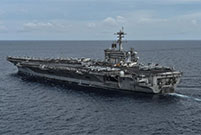 Photos of U.S. Navy intruding in South China Sea released
Photos of U.S. Navy intruding in South China Sea released Cats who immediately regretted their life choices in photographs
Cats who immediately regretted their life choices in photographs Beautiful girl from police college becomes Internet hit
Beautiful girl from police college becomes Internet hit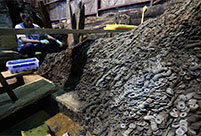 10 tons of copper coins unearthed in 2,000-yr old tomb
10 tons of copper coins unearthed in 2,000-yr old tomb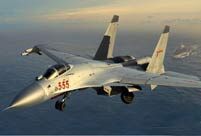 In Pics: Amazing Chinese fighters
In Pics: Amazing Chinese fighters
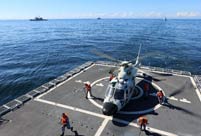 Chinese, U.S. navies hold first-ever joint exercise in the Atlantic
Chinese, U.S. navies hold first-ever joint exercise in the Atlantic When a Chinese woman marries an Indian man
When a Chinese woman marries an Indian man Photos of beautiful teacher hit the Internet
Photos of beautiful teacher hit the Internet Top 20 hottest women in the world in 2014
Top 20 hottest women in the world in 2014 Top 10 hardest languages to learn
Top 10 hardest languages to learn 10 Chinese female stars with most beautiful faces
10 Chinese female stars with most beautiful faces China’s Top 10 Unique Bridges, Highways and Roads
China’s Top 10 Unique Bridges, Highways and Roads Parents fume over toxic tracks
Parents fume over toxic tracks E-commerce in the cross hairs
E-commerce in the cross hairs Can France’s daring move eradicate IS
Can France’s daring move eradicate IS Aid to HIV-positive Uyghur women obstructed by Islamic extremists
Aid to HIV-positive Uyghur women obstructed by Islamic extremistsDay|Week